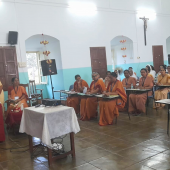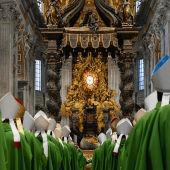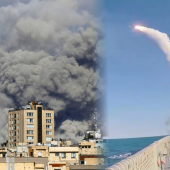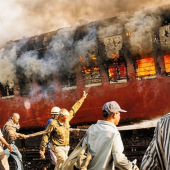Francis: An Easter Pope
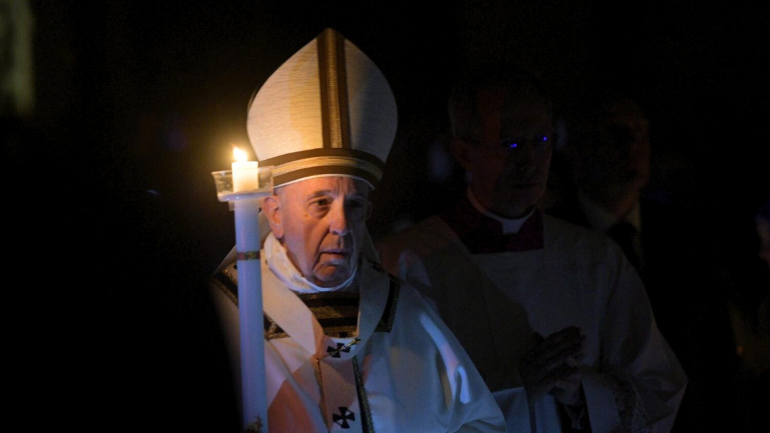
Pope Francis did not merely teach about Easter’s promise—he lived it until his final breath.
At 9:45 on Easter Monday morning, as Cardinal Kevin Farrell announced that Pope Francis had "returned to the house of the Father," a profound chapter in our global story came to a close.
His humble servant left a legacy that will endure — a living testimony to Easter’s power of renewal that speaks to people of all faiths and none.
From his election in 2013 until his final days, Francis embodied the promise of the resurrection through simple, deliberate choices. He wore a plain white cassock instead of ornate vestments. He lived in a modest guesthouse rather than the Apostolic Palace. These were not merely symbolic gestures but authentic expressions of Easter’s core message: true strength emerges through humility and service.
His transformation of the Holy Thursday foot-washing ritual revealed his vision most clearly. Breaking with centuries of tradition, Francis knelt before society’s most marginalized—prisoners, refugees, the elderly, even Muslim and female inmates. These were not calculated photo opportunities but profound demonstrations that dignity belongs to all people regardless of status, gender, or faith. Through these acts, Easter’s ancient promise of restoration became visible in our modern world.
During the 2020 pandemic, Francis stood in an empty St. Peter’s Basilica and spoke of a "contagion of hope" that could counter the virus’s devastation. This powerful image demonstrated his gift for connecting timeless truths to present suffering. Throughout his papacy, Francis portrayed Easter not as a distant historical event but as a living reality demanding a response here and now. He challenged everyone—no matter their belief—to become agents of healing in a wounded world.
Mercy defined Francis’s legacy. He understood that, at its heart, Easter represents the ultimate act of reconciliation. His declaration of an Extraordinary Jubilee of Mercy invited people to experience compassion anew. His description of the Church as a "field hospital" for wounded souls perfectly captured Easter’s promise of healing for all who suffer. By opening “Holy Doors” in unexpected places like homeless shelters, he showed that genuine care reaches where attention rarely extends.
Francis consistently championed those on the margins of society. His groundbreaking encyclical Laudato Si’ linked care for the environment with care for the vulnerable, presenting both as expressions of hope for a renewed world. When climate disasters struck or refugees fled war zones, he responded with practical aid alongside spiritual comfort. When he invited homeless individuals to dine with him after Easter Mass, he demonstrated that faith must be expressed through concrete acts of inclusion that change lives.
His global impact extended well beyond religious circles. Through unprecedented interfaith initiatives—praying with Jewish and Muslim leaders, visiting war-torn Iraq despite grave security concerns, and engaging Buddhist monastics—he embodied reconciliation across ancient divisions. In a world increasingly divided by populism and nationalism, Francis pleaded for bridges where walls had stood for centuries. His moral authority on issues from climate change to migration shaped international policy discussions and offered ethical clarity in complex debates.
His path was not without struggle. Reforms addressing clergy abuse, financial corruption, and ecclesiastical elitism provoked fierce resistance. Critics argued that his emphasis on mercy undermined tradition. Yet these challenges only deepened his leadership’s impact. Francis confronted institutional failings while maintaining hope for renewal—embodying Easter’s paradoxical wisdom: that new life often emerges through difficulty.
In his final years, physical frailty limited his mobility but never dimmed his spirit. Each Easter, he stood before the world—sometimes leaning on a cane, yet radiating unmistakable joy. His warm smile conveyed what words struggle to articulate: that hope transcends circumstances. For Francis, the promise of renewal applied not just to religious observance but to every aspect of human experience.
Francis did not merely teach about Easter’s promise—he lived it until his final breath. His life reminds us that renewal comes through small, daily acts of mercy that gradually transform our world. In such actions lies his enduring legacy: showing how ancient wisdom speaks with fresh power to contemporary challenges. Francis demonstrated that authentic joy emerges when compassion overcomes indifference—the promise of Easter he now experiences in fullness.
(John Singarayar, a priest of the Society of the Divine Word from the Mumbai Province in western India, holds a doctorate in anthropology. He contributes regularly to journals and publications focusing on sociology, anthropology, tribal studies, spirituality, and mission.
Radio Veritas Asia (RVA), a media platform of the Catholic Church, aims to share Christ. RVA started in 1969 as a continental Catholic radio station to serve Asian countries in their respective local language, thus earning the tag “the Voice of Asian Christianity.” Responding to the emerging context, RVA embraced media platforms to connect with the global Asian audience via its 21 language websites and various social media platforms.









